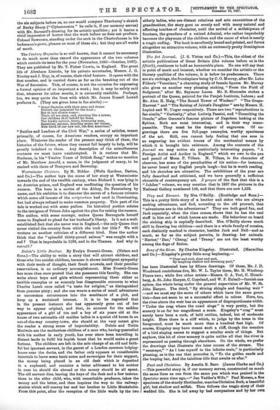Buleie's Little .Brother. By Evelyn Everett-Green. (Nelson and Sons.)—The ability
to write a story that will attract children, and those who live amidst children, because it shows intelligent sympathy with their mode of thought, their frank avowals, and their peculiar reservations, is no ordinary accompliehment. Miss Everett-Green has more than once proved that abs possesses this faculty: She can write about boys and girls without representing them either as terrible examples or as scarcely less disagreeable converts to what Charles Lamb once called "a taste for religion," as distinguished from genuine piety; and she can weave a series of small adventures or uncommon occurrences into the semblance of a plot, and keep up a =gained interest. It is to be regretted that in the present instance she has apparently gone out of her way to appear original, and that, to account for the sadden appearance of a girl of ten and a boy of six years old at the house of two estimable old maiden ladies in a quaint old house in an cot-of-the-way country-town, she should at the very outset give the reader a strong sense of improbability. Dulcie and Tottie Merivale are the motherless children of a man who, having quarrelled with his mother in early youth, has ever since been travelling in distant lands to fulfil his boyish boast that he would make a great fortune. The children are left in the sole charge of an old and faith- ful but ignorant servant, in the garret of a London common lodging- house near the docks, and the father only appears at considerable intervals to leave some bank-notes and sovereigns for their support, the money being placed in an old desk which is deposited in a cupboard, and contains a letter addressed to his mother in case he should die abroad or the money should be all spent. The old servant dies, leaving the keys of the desk and a few instruc- tions to the elder child, who, with remarkable prudence, takes the money and the letter, and then inquires the way to the railway- station which will convey her and her brother to Little Monksholm. From this point, after the reception of the little waifs by the two elderly ladies, who are distant relatives and sole executrixes of the grandmother, the story goes on evenly and with many natural and affecting touches of character, until the arrival of a midshipman of fourteen, the grandson of a retired Admiral, who rather improbably becomes the playmate of the children and the cause of what is nearly a tragic ending. The book is excellently bound and printed, and forms altogether an attractive volume, with an extremely pretty frontispiece illustration.






















































 Previous page
Previous page